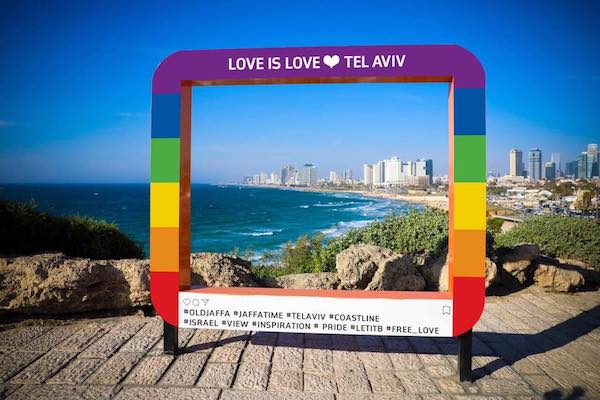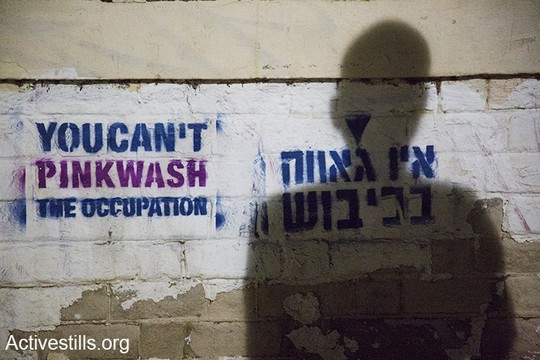Next week, as tourists descend on Tel Aviv for the yearly pride parade, a separate international contingent will touch down in the city for a high-profile arms fair.
By Tanya Rubinstein

The upcoming Tel Aviv Pride parade has set social media, the streets and the queer community alight. In preparation for the June 9 march, the city’s streets are already filling up with rainbow flags and cute tourists.
Luckily for the parade’s organizers, this year’s event is taking place in the second week of June rather than the first, which marks 50 years since the start of the 1967 occupation. We already saw the March of the Flags in all its glory on Jerusalem Day last week, including the shuttering of Palestinian businesses and the clearing of Palestinians off the streets, and severe police violence against Jewish demonstrators who were trying to stop the march from passing through the Old City’s Muslim Quarter.
These aren’t really the pictures of masses of flags that the Tourism Ministry and the Ministry of Foreign Affairs want tourists to see. Indeed, pride events in Israel over the last few years have been a hasbara tool, aimed at showing the world a (false) picture of Israel as a Western, pluralistic, democratic country that respects human rights. It’s what LGBTQ activists refer to as “pinkwashing.”
So it is that during Pride week in Tel Aviv, which will bring thousands of tourists from around the world to celebrate on the beach, a separate international contingent will be in town to admire the Israel’s arms industry’s wares at the ISDEF exhibition.
The expo, held every two years at the Tel Aviv Convention Center, proudly displays cutting-edge military technology to representatives from dozens of countries. It’s one of the largest arms expos in the world, and the biggest in Israel. Throughout the exhibition, Israel will sell its technological developments to foreign countries, including those under arms embargoes for violating human rights.
It’s no accident that Israel is one of the world’s biggest military exporters. The territories and people under Israeli occupation enable the military to develop, test out and perfect new technologies on the battlefield. As a result, Israel can compete with world powers in the global arms trade, and is prepared to sell its wares to the highest bidder — no matter the human rights situation in the purchasing country.
Two days after ISDEF concludes, the very same Tel Aviv Convention Center will host the traditional pride afterparty held by Ofer Nissim, an Israeli DJ. It’s similar to how Tel Aviv Pride’s technicolor parade forgets the origins of the pride march — the struggle for human rights, of which there is barely any trace left in an event that now celebrates capitalism, pinkwashing and rights we’ve never really received here.

Next week will bring, more than ever, a glimpse into the cognitive dissonance at work here. It’s a real trip: In the Tel Aviv bubble, thousands will celebrate pride and love, while militarism and violence are fêted alongside them. And this is nothing new — every year, uniformed soldiers march in the Tel Aviv Pride parade, representing initiatives aimed at equality for LGBTQs in the IDF, even as they are active participants in the repression of and violence against a civilian population.
Also present at the parade will be members of the Shin Bet, who take part in torture and abuse. And all this will take place on land from which Palestinians were expelled in 1948, and on a beach that many West Bank residents cannot visit because of severe restrictions on their freedom of movement.
The LGBTQ struggle was, at its inception, a struggle for the right to life, security, and self-determination. But these rights are systematically and brutally denied to Palestinians — and by the same institutions and leaders that benefit from the positive marketing of Israel as a country that safeguards the rights of (part of) the LGBTQ community.
Also scheduled for that second week of June is INsecurity: The Military Industries Shadow Conference, held by Hamushim, a project of the Coalition of Women for Peace. Representatives from countries that use Israeli-made arms will talk about how new military technology is developed here, the link between the occupation and the arms industry, and the poor oversight on military exports.
The conference will also examine these issues, and the idea of “security” in general, from a feminist perspective. The goal is to try and understand how industries that flaunt the term “security” actually profit from occupation and the violation of human rights, and the price many pay as a result.
Tanya Rubinstein is the Co-Coordinator at the Coalition of Women for Peace. This article was first published in Hebrew on Haokets. Translated by Natasha Roth.


